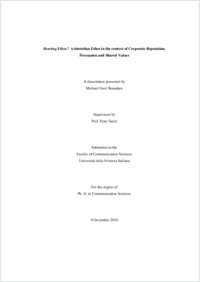Shorting ethos? : Aristotelian ethos in the context of corporate reputation, persuasion and shared values
- Shanahan, Michael Ford
- Seele, Peter (Degree supervisor)
-
24.04.2017
149 p.
Thèse de doctorat: Università della Svizzera italiana, 2017
English
Corporate ethics is a complex field of study that focuses on the sources and role of moral expectations among modern corporate stakeholders. While there has been significant theoretical development and adoption by practitioners on the topic over the past thirty years in the field, ethical scandals persist, almost at unprecedented levels. The pressure to meet short term shareholder financial targets, the lack of consistency and clarity of moral expectations among stakeholders, the corporation as an imperfect social environment, all contribute to the status quo where corporate ethics can be a familiar but elusive goal. At the same time, there have been fundamental changes in the flow of information recently. Information now flows as speeds and volumes unimaginable thirty years ago. More importantly, it now flows through very decentralized patterns such as social media which have changed the ability of corporations to manage their reputation and brand. This paper focuses on one concept within the broader field of ethics, virtue, in an attempt to better understand the role that it currently plays, but also could play, in business ethics by studying its application in persuasion. Chapter I provides an overview of the concept of ethos which can be roughly translated as moral character, and positions it in the context of the modern corporation. Corporate moral character is evidenced through the decisions a company makes via its decision-makers and actors, which often have an impact on the various stakeholders including customers, clients, the government etc. Chapter II traces the relationship between virtuous conduct and corporation reputation management. It proposes that virtue, through its role in ethos can be intrinsically beneficial to a corporation and a competitive advantage in the marketplace in terms of corporate reputation, which is increasingly viewed as a valuable asset. According to Aristotle, Ethos has three components; virtue, practical wisdom and goodwill towards others (Arist. Rhet I.2,1356a). Ethos is a critical element to persuasion along with pathos (use of emotion) and logos (use of logic); speakers that embrace all three in a message will be more persuasive. Corporations routinely rely on persuasion to be effective and successful, from advertising to sales, to employee relationships. Chapter III then proposes corporate virtue as a form of Shared Value (SV), a theory proposed by Porter and Kramer (2011). While Shared Value has received critical acclaim over the years as an economic theory effectively and efficiently promoting the interests of the broader society at the same time as the interests of the modern corporation, the theory has been challenged more recently for its lack of clear definition and ability to be implemented properly. This chapter argues that corporate virtue meets the qualifications of Shared Value, and should be promoted within corporations in view of its influence on persuasion, positively benefitting the company, and the positive effects that virtue has on corporate stakeholders like society, employees, government etc. Chapter IV explores the concept of persuasion at a higher level, particularly as it can be related to organizational communications and organizational rhetoric. Persuasion is a concept that has likely existed as long as there has been communication.. The study of persuasion can be traced back to ancient Greece where Aristotle put structure to the process as a means of creating an educated citizen, an element critical to emerging democracies. The chapter is framed around the notion that persuasion as a means of attitude change can be developed in a more instrumental manner characterized by one way communication such as traditional marketing and public relations efforts. The chapter proposes that persuasion can also be developed in a more deliberative manner, which is supported in the etymological root persuadere, emphasizing a more ethical discourse including two way communication and more equal bargaining position. It then looks at how persuasion is developed in the organizational context today, including advances in the social sciences to better understand the mechanisms of persuasion including the Elaboration Likelihood Model, inoculation theory model and expectancy value theory, suggesting that persuasion in a deliberative manner is underdeveloped in organizational rhetoric. Lastly, Chapter V describes the advent and implications of corporate reputation risk through the case study of Goldman Sachs in 2008. Reputation risk develops when actual corporate behaviour deviates from the reputation that the corporation has among its stakeholders in regards to any particular trait. To the degree there is a difference between a corporation’s reputation or how it is perceived in regards to a particular topic such as product quality, timeliness, altruism, truthfulness, and its actual behaviour, then reputational risk may develop to the degree that its reputation, an increasingly valuable asset to companies today, may be devalued. To the degree that ethical or virtuous conduct is a component of a corporate brand, which is critical particularly in service industries such as banking, any lack of consistency with actual conduct could have significant financial implications. Collectively these chapters demonstrate how virtue and its role in persuasion serves as a common denominator in business ethics, and a valuable vehicle to promote ethical conduct in a complicated social environment called capitalism.
- Language
-
- English
- Classification
- Information, communication and media sciences
- Notes
-
- Cum laude
- License
-
License undefined
- Identifiers
-
- RERO DOC 288767
- URN urn:nbn:ch:rero-006-116119
- ARK ark:/12658/srd1318718
- Persistent URL
- https://n2t.net/ark:/12658/srd1318718
Statistics
Document views: 441
File downloads:
- Texte intégral: 771
